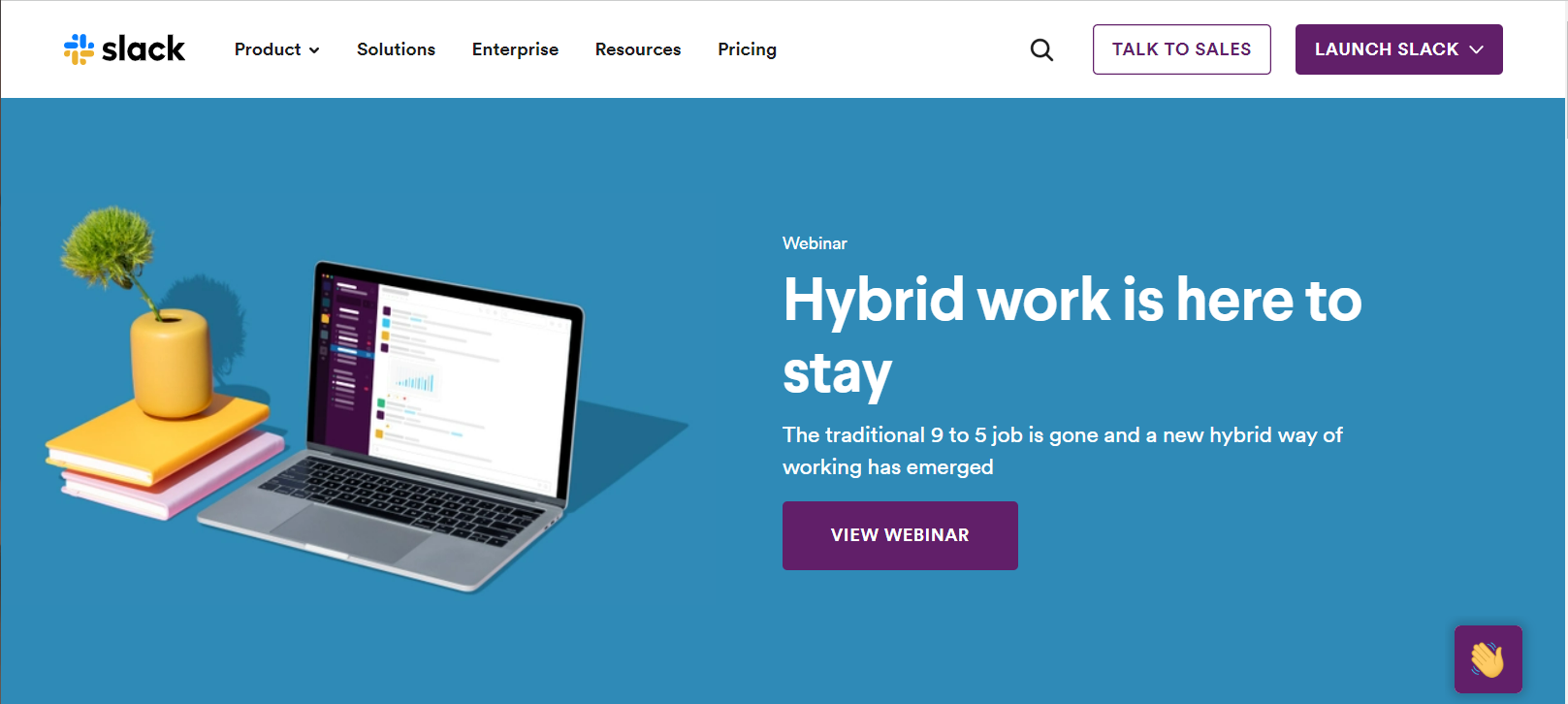|
The traditional 9 to 5 job is gone and a new hybrid way of working has emerged. Are you a knowledge based worker or does your job demand your attendance at work? Cal Henderson, CTO and Co-Founder of Slack sat down with Sarah Cannon, Partner at Index Ventures at the Economist’s Innovation at Work Week to discuss why we don’t need to go back to the way we were working. Through the crisis we’ve uncovered solutions to adapt to this new way of working– distributed teams, flexible work days– all while staying connected with best in class productivity tools. What will the future of this new hybrid work look like? How will organisations adjust their processes and tools? Will this new way stick or will we revert back to a traditional workforce again when allowed back to the office? Research and findings from ‘Future Forum,’ a new consortium that Slack is incubating, will help companies assess the data and analysis needed to navigate the new world of work Things you’ll learn:
Source slack.com/intl/en-gb/events/hybrid-work-is-here-to-stay-why-we-dont-need-to-go-back-to-the-way-we-were-working Guidance on Legal Bases for Processing Personal Data One of the first questions which organisations involved in processing personal data (‘controllers’) should ask themselves before undertaking the processing is “What is my reason or justification for processing this personal data?” This is of key importance because any processing of personal data is only lawful where it has what is known as a ‘legal basis’. Article 6 of the General Data Protection Regulation (GDPR) sets out what these potential legal bases are, namely: consent; contract; legal obligation; vital interests; public task; or legitimate interests. The aim of this guidance is primarily to assist controllers in identifying the correct legal basis for any processing of personal data which they undertake or plan to undertake – and the obligations which go with that legal basis. Additionally, this guidance should assist those individuals whose personal data may be processed (‘data subjects’) in identifying whether the processing of their personal data is lawful, and, as part of that, what the legal basis for that processing may be. GDPR Fundamentals: Legal Basis For Processing Data
August 23, 2018/ Mark Hinely GDPR requires any organization processing personal data to have a valid legal basis for that processing activity. The law provides six legal bases for processing: consent, performance of a contract, a legitimate interest, a vital interest, a legal requirement, and a public interest. 6 Legal Bases for Processing Personal Data One of the seven major data processing principles of GDPR is to ensure that personal data is processed lawfully, fairly, and transparently. To comply this principle, Chapter 6 of the GDPR requires any organization processing personal data to have a valid legal basis for that personal data processing activity. Think of these as scenarios in which it would be lawful to process data. GDPR provides six legal bases for processing:
Anthony Boe, Business Growth Advisor Back To Basics: The Marketing Mix – The 4Ps
The ‘4P’s model, was developed in the 1960s by E. Jerome McCarthy. The model has since expanded to include three more dimensions and is now often referred to as the ‘7Ps’. While this is a well-worn and familiar technique, it still offers a way to do an efficient marketing review, quickly identify problems and focus on where ideas are needed. By applying the 7Ps, firms can swiftly explore how they may be able to change elements of their marketing mix to account for the restrictions that the COVID-19 pandemic is imposing on their promotional activities. Here’s a basic overview of the model:
Read more ... Everything you need to know about writing a good CV. 7 seconds. That's the average time a recruiter spends looking at a CV. All it takes is a simple formatting error or omission to land your CV in the rejection pile. And with more healthcare providers than ever looking for employment, making sure your CV stands out and checks all the boxes is the best way to get noticed. Why is a good CV important? A CV serves three main purposes:
Chandlee Bryan, M.Ed., is a certified professional resume writer, coach and former Ivy League career counselor and highlighted a number of aspect when applying for a position.
Take a big picture perspective of your skills and training relative to their needs—or get a second opinion on what differentiates you from your peers and colleagues.
Sources
https://comphealth.com/cornerstone/writing-a-cv https://comphealth.com/resources/how-to-avoid-looking-like-a-cookie-cutter-applicant-in-the-job-search/ The 4 phases of retirement | Dr. Riley Moynes TED Talk Imagine squeezing all the juice out of retirement! When interviewed on his research, Dr. Riley Moynes commented, “I wish I knew then what I know now about the psychological challenges that accompany retirement. It would have made things much clearer and easier.”
By interviewing hundreds of retirees, he has discovered a framework that can help make more sense of this challenging chapter of our lives…one that, for many, could last for 30 years or more. If you’re retired, this talk will make things much clearer for you. If you’re not, you’ll have a better idea of what to expect when that time comes. Riley has enjoyed a distinguished career spanning four decades in both public and private sectors. In public education, he served as a teacher, Department Head, a Superintendent and a Director of Education. He also authored several textbooks including a History of Russia, and a World Religions text. In the private sector, he was a Founding Partner of a national wealth management firm, author of a book entitled The Money Coach which enjoyed sales of over 200,000 copies in six editions, and co-author of several editions of Top Funds. Since stepping back from day-to-day involvement in financial services, Riley researches and writes reader-friendly publications on topics of general interest, and presents Workshops across the country based on those publications. One of his most recent books, The Four Phases of Retirement, became a Canadian best-seller within 12 months of publication, and is the basis of his TEDx Talk. In the book, he explains how he waltzed through Phase One of retirement, struggled in Phase Two, tried a dozen ventures in Phase Three and now in Phase Four, assists others as they navigate their way through the psychological changes and challenges almost everyone faces in retirement. This talk was given at a TEDx event using the TED conference format but independently organized by a local community. Learn more at https://www.ted.com/tedx Robert Kiyosaki broke the internet with this life-changing speech. They don't want you to see this! This is why the poor stay poor and the rich get richer! Warren Buffett Leaves The Audience SPEECHLESS One of the Most Inspiring Speeches Ever Warren Buffett shares two stories about women who started from nothing and sold their businesses to the legendary investor. This is one of the greatest speeches Mr. Buffett has ever delivered and he also gives really good advice to all entrepreneurs in the audience. Warren E. Buffett is an American long-term investor, philanthropist, business tycoon, and the chairman & CEO of Berkshire Hathaway. He is considered one of the most successful investors in the world and has a net worth of over 100 billion dollars. Buffett was born in Omaha, Nebraska. He developed an interest in business and investing in his youth and made truly incredible stock market returns over his career. Share this video with a friend if you found it useful! Consider subscribing to the channel for videos about investing, business, stock market, managing money, building wealth, passive income, and other finance-related content! Angela Hausman, PhD
Last updated: 5 July 2022 As a good product manager, you routinely monitor key metrics that track the performance of your product only to find your product isn’t selling over a period of time. Sure, you didn’t expect product sales to take off like a rocket ship (although that would make you supremely happy), but your product’s been on the market for a while and sales are dismal. What should you do next? Well, the answer depends on a variety of factors. Today, we’ll discuss 4 factors contributing to poor product sales. Product factors impacting sales If your product isn’t selling, the first step is to investigate WHY sales lag. Making changes to your marketing strategy must follow a structured investigation of factors causing the problem. Sometimes, a product’s sales fail to meet expectations due to normal variations sales across the product category, since sales don’t always occur at the same level but reflect small variations over time. For instance, sales of steaks in supermarkets increase over the summer, when more people grill versus other parts of the year. Over-correcting when no underlying problem exists results in yo-yoing sales and unnecessary marketing expenses. Think of this as a golfer who shot her ball short of the hole. She overcompensates by hitting the ball too hard, sending it past the hole. Recognizing her error, she hits the next shot too softly and the ball falls short of the hole. Back to a harder swing, she now overshoots the hole again. Her strategy resulted in a poor score to achieve her goal (ball in hole). If, instead, she took the time to study her shot, estimate the force necessary to drop the ball in the hole, her score improves. That’s what businesses face when they feel forced to react to every blip in their sales figures. Your investigation when your product isn’t selling should start by looking at these factors:
Read the full article below SOURCE https://www.business2community.com/product-management/4-reasons-your-product-isnt-selling-and-what-to-do-about-it-02327765 In today’s blog post, we are going to define information overload, explore its causes, impact on both employees and businesses and how to effectively deal with it.
What is information overload? In its simplest form, information overload refers to the excess or the abundance of information available to employees when performing tasks or making decisions. The term first originated in Bertram Gross’s 1964 book “The Managing of Organizations”. Gross explained that information overload is likely to occur when the quantity of information available exceeds one’s capacity to process it thus reducing the quality of decisions to be made. However, in the absence of adequate policies and strategies to support such solutions, employees may become overwhelmed and overloaded with information. This obviously contributes to a lack of productivity, growing sense of frustration among employees and an overall bad employee experience and business performance. This phenomenon is generally referred to as “information overload”, infobesity or infoxication. Everything you need to know about information overload in the workplace
SOURCE https://www.exoplatform.com/blog/what-is-information-overload-and-how-to-overcome/ Blogging is absolutely still relevant in 2022.
If you’re wondering whether or not people still read blogs, then you’re in the right place. In short, hell yes… blogging is still very much alive, with more bloggers (and readers) reported this year than ever before. In fact, roughly 409 million internet users read about 20 billion blog pages monthly. This is why 53% of marketers prioritize blogging as their primary content marketing strategy. Furthermore, blogging continues to flourish with a 12% increase in the last 5 years. 5 Ways to Grow Your Blog in 2022 https://www.locationrebel.com/grow-your-blog/ What is Web 3.0 and how does it work? Web 3.0/ Web3, also known as semantic web or the spatial web, is the third generation of the internet that will be more user friendly, safer, as well as decentralized. It means that users own their data as well as their online presence. Much like with a blockchain there is no one server that holds the information and it is at different “blocks” chained together. However, information will be shared to platforms and sites that the users access due to interoperability.
Web3 allows the interaction with data in conjunction with AI as well as machine learning while combining the idea of Semantic Web. It is due to this that Web3 can grant Decentralized Applications (or Dapps) to replace centralized social networks. What this means is that users can own, buy and manage their own domain name/ apps/ programs, etc. while also being able to move it around as they see fit. Therefore, users can control their site, Dapps, platforms instead of a group of servers that are under a company’s name. 5 Killer Tips for Creating LinkedIn Posts That Hook Readers The majority of B2B marketers know the power of LinkedIn. They understand that this single platform is where their customers are spending time, connecting — and reading content. This is likely why 94 percent of B2B marketers are using LinkedIn, with it being their primary choice among all social networks. But many wonder, “Are we doing LinkedIn right?”
Read More https://bit.ly/Get-Creative-Today Hybrid work is here to stay
While the world sheltered in place, our expectations for the workplace evolved. During the height of the pandemic, we relied on technology to keep us connected with colleagues and friends. Through this difficult period, many of us discovered what it’s like to get extra time in our day—from taking up new hobbies to reconnecting with friends and family. This increased flexibility isn’t something the workforce wants to give back, with 91% saying they’d prefer a remote or hybrid work model going forward.. https://www.webex.com/gp/hybrid-work-research.html See Video https://bit.ly/Future-Of-Work-Is-Hybrid |
AuthorI am an innovator. Archives
August 2022
Categories
All
|









 RSS Feed
RSS Feed
